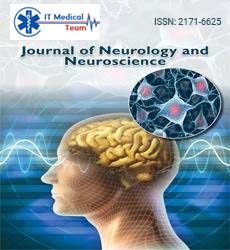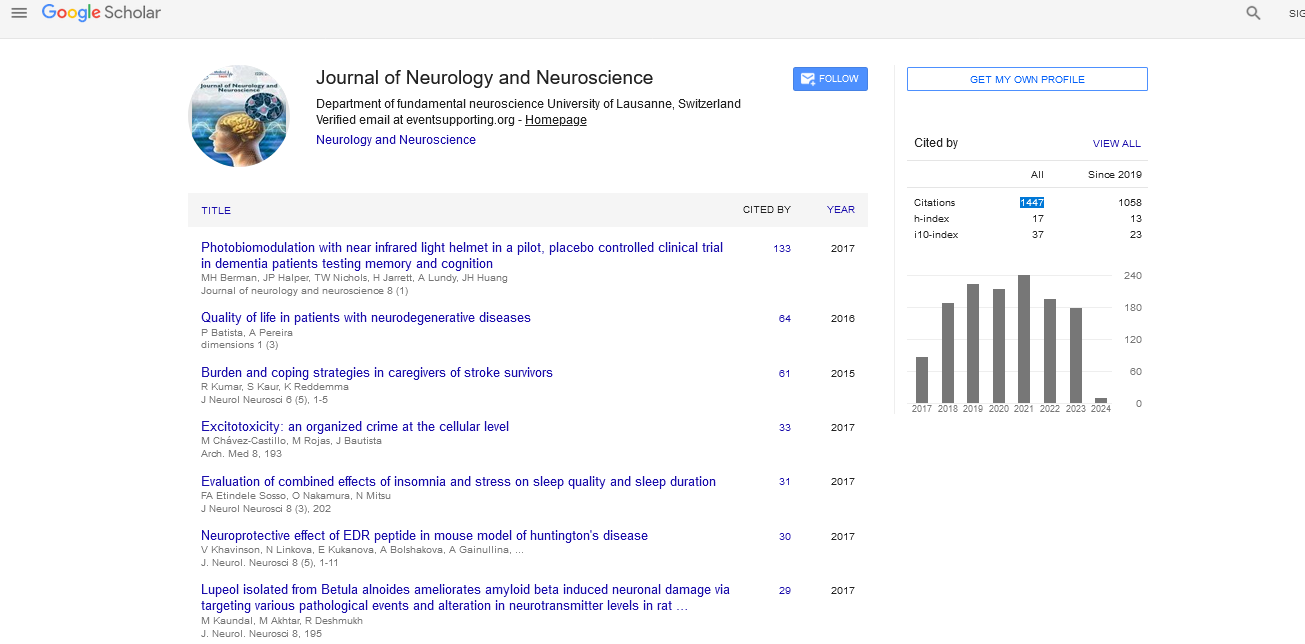Opinion - (2023) Volume 14, Issue 4
The gut microbiome's influence on neurological health and disease
Elisabetta Gambini*
Department of Clinical Psychology, Paracelsus Medical Private University, Strubergasse 21, 5020 Salzburg, Austria
*Correspondence:
Elisabetta Gambini, Department of Clinical Psychology, Paracelsus Medical Private University, Strubergasse 21, 5020 Salzburg,
Austria,
Email:
Received: 29-May-2023, Manuscript No. ipjnn-23-14071;
Editor assigned: 31-May-2023, Pre QC No. P-14071;
Reviewed: 14-Jun-2023, QC No. Q-14071;
Revised: 20-Jun-2023, Manuscript No. R-14071;
Published:
28-Jun-2023
Introduction
The gut microbiome, a complex ecosystem of trillions
of microorganisms residing in the gastrointestinal tract, has
emerged as a pivotal player in regulating various aspects
of human health. Recent research has illuminated the
profound influence of the gut microbiome on neurological
health and disease. This paper embarks on an exploration
of the intricate interplay between the gut microbiota and
the central nervous system, with a particular focus on its
implications for neurological conditions. As we uncover the
mechanisms by which gut microbes communicate with the
brain and influence neural function, we gain new insights
into the pathogenesis and potential therapeutic avenues
for neurological disorders. Understanding this dynamic
relationship opens promising pathways for enhancing
neurological health and addressing the challenges posed by
neurodegenerative diseases [1,2].
Description
The description section delves into the content of the
paper, providing a comprehensive overview of the topic. It
explores the gut-brain axis, a bidirectional communication
system connecting the gut microbiome and the central
nervous system. It discusses how gut microbes produce
neurotransmitters, metabolites, and immune signals
that impact neural function and behavior. Furthermore,
this paper reviews the latest research findings on the gut
microbiome's role in various neurological conditions,
including Alzheimer's disease, Parkinson's disease, multiple
sclerosis, and mood disorders. It highlights the potential
mechanisms by which gut dysbiosis, inflammation, and the
gut-brain axis dysfunction contribute to the development
and progression of these disorders [3].
The description also explores the therapeutic
implications of modulating the gut microbiome for
neurological health. It discusses emerging treatments,
such as probiotics, prebiotics, dietary interventions, and
fecal microbiota transplantation, which hold promise
in ameliorating symptoms and potentially slowing the
progression of neurological diseases. Moreover, it addresses
the significance of personalized medicine in leveraging
the gut microbiome's influence on neurological health, as
individual variations in gut microbial composition may
have distinct effects on disease susceptibility and treatment
outcomes [4,5].
Conclusion
In conclusion, the gut microbiome's impact on neurological health and disease is a rapidly evolving field
that promises to revolutionize our understanding of brain
function and neurodegenerative conditions. As we uncover
the intricate web of interactions between gut microbes and
the central nervous system, we gain valuable insights into
the potential prevention and treatment of neurological
disorders.
Harnessing the therapeutic potential of the gut microbiome represents a novel frontier in the field of
neurology. It offers hope for more effective interventions
that may not only ameliorate symptoms but also address
the underlying mechanisms driving neurological diseases.
However, this journey also underscores the importance of
continued research, interdisciplinary collaboration, and
a personalized approach to unlock the full potential of
the gut-brain axis in promoting neurological health and
combating neurological disorders.
References
- Mozaffarian D, Benjamin EJ, Go AS, et al. Heart disease and stroke statistics—2016 update: A report from the American Heart Association. circulation. 2016;133(4):e38-60.
Google Scholar, Crossref, Indexed at
- Singh SB, Ng SJ, Lau HC, et al. Emerging PET tracers in cardiac molecular imaging. Cardiol Ther 2023;12(1):85-99.
Google Scholar, Crossref, Indexed at
- Glaudemans AW, de Vries EF, Galli F, et al. The use of F-FDG-PET/CT for diagnosis and treatment monitoring of inflammatory and infectious diseases. Clin Dev Immunol 2013;2013.
Google Scholar, Crossref, Indexed at
- Liu H, Wingert A, Wang JA, et al. Extraction of coronary atherosclerotic plaques from computed tomography imaging: a review of recent methods. Front Cardiovasc Med 2021;8:597568.
Google Scholar, Crossref, Indexed at
- Tzolos E, Dweck MR. 18F-sodium fluoride (18F-NaF) for imaging microcalcification activity in the cardiovascular system. Arterioscler Thromb Vasc Biol. 2020;40(7):1620-6.
Google Scholar, Crossref, Indexed at





